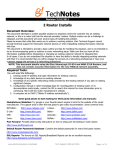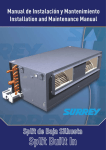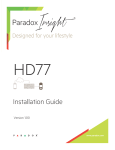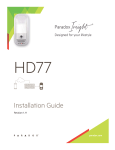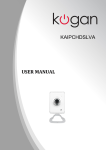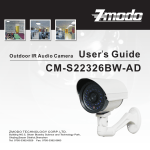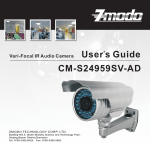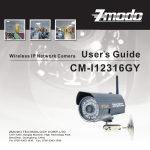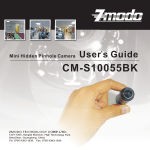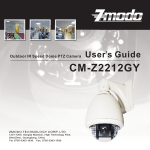Download ZMODO IP Camera User manual
Transcript
NVR + IP Camera User Manual For further help, please visit www.zmodo.com ® Preface This product series is a 4 or 8 channel embedded NVR with pentaplex functionality: the product will perform live video preview, recording, playback, remote access, and backup simultaneously. This advanced product series receives a high quality video stream that is transmitted digitally by the IP Camera (IPC). This video signal is encoded by the NVR and enabled for recording, viewing, configuring, and playback. This document mainly focuses on the installation and configuration of NVR LAN application system. With high performance video, user-friendly GUI, and practical industrial designs; this series NVR is suitable for civil applications such as homes, stores, internet cafes, and small businesses in addition to mainstream security and surveillance applications. Declaration • The content in this manual may be different from the product version you are using. If you experience any issue that is not mentioned in this manual, please contact our tech-support or Zmodo Knowledge Base at kb.zmodo.com. • The software will be updated as necessary. Our company reserves the right to update without notice. Target Reader This manual is primarily intended for the following users: • System planner • Onsite tech-support and maintenance personnel • Administrator for system installation • Users for business operation Conventions • Click: Refers to left-click with your mouse • Double click: Refers to left-double-click with your mouse • Right Click: Refers to right-click with your mouse • Square brackets "[ ]" indicates the window name, menu name and data sheet, such as [Download] 1 ® Catalog Part 1: NVR Introduction 1 INTRODUCTION .......................................................................................................................................4 1.1 Brief Introduction .................................................................................................................................4 1.2 Main Functions and Features ..............................................................................................................4 1.3 Installation Instructions ........................................................................................................................4 1.3.1 Device and Accessories list .........................................................................................................4 1.3.2 Front Panel ..................................................................................................................................5 1.3.3 Rear Panel ...................................................................................................................................5 1.3.4 Remote Controller ........................................................................................................................5 1.3.5 Hard Drive Requirements ............................................................................................................6 1.3.6 Hard Drive Installation .................................................................................................................6 1.3.7 Device Connection .......................................................................................................................7 2 NVR INTERFACE INSTRUCTION ............................................................................................................7 2.1 Login ....................................................................................................................................................7 2.2 Shortcut Menu .....................................................................................................................................8 2.3 Main Menu ..........................................................................................................................................13 2.3.1 Playback ......................................................................................................................................13 2.3.2 INFO ...........................................................................................................................................14 2.3.3 Setting ........................................................................................................................................15 2.3.4 IPC MANAGE .............................................................................................................................24 2.3.5 Advanced Setting .......................................................................................................................24 2.3.6 Backup ........................................................................................................................................21 APPENDIX ..................................................................................................................................................29 3.1 SPECIFICATIONS ................................................................................................................................29 3.2 System Default Values ..........................................................................................................................30 Part 2: IP Camera Introduction 1. PRODUCT INTRODUCTION ..................................................................................................................32 1.1 BRIEF INTRODUCTION ....................................................................................................................32 1.2 MAIN FEATURES .............................................................................................................................32 1.3 INSTALLATION STATEMENT ...........................................................................................................33 1.4 NETWORK IP CAMERA CONNECTION ..........................................................................................33 2 ® 2. LOG IN ....................................................................................................................................................33 3. PREVIEW ...............................................................................................................................................35 4. SYSTEM SETTING .................................................................................................................................36 4.1 LOCAL CONFIGURATION .................................................................................................................36 4.2 REMOTE CONFIGURATION .............................................................................................................37 4.2.1 Video Setting ..............................................................................................................................37 Video Coding ..............................................................................................................................37 Video Block .................................................................................................................................38 4.2.2 Network Parameter .....................................................................................................................39 Wired Setting ..............................................................................................................................39 Wi-Fi Setting ...............................................................................................................................39 Listener Port (LPRT) ...................................................................................................................41 PPPOE .......................................................................................................................................41 UPnP (Auto Port Mapping) .........................................................................................................42 Email ...........................................................................................................................................43 FTP .............................................................................................................................................43 DDNS .........................................................................................................................................44 4.2.3 Video Setting ..............................................................................................................................45 4.2.3.1 Video Loop .....................................................................................................................45 4.2.3.2 Video Plans ....................................................................................................................45 4.2.4 Alarm setting ...............................................................................................................................46 4.2.5 System Information .....................................................................................................................46 4.2.6 Advanced Setting ........................................................................................................................47 4.2.6.1 User Management ..........................................................................................................47 4.2.6.2 Periodic Maintenance .....................................................................................................48 4.2.6.3 Software Update .............................................................................................................49 5. APPENDIX ...............................................................................................................................................50 APPENDIX 1 SPECIFICATION .................................................................................................................50 APPENDIX 2 SYSTEM DEFAULT PARAMETERS ...................................................................................50 APPENDIX 3 APPLCIATION FOR DDNS DOMAIN SERVICE .................................................................51 3 ® Part 1: NVR Introduction 1 Introduction ▇▅▃ 1.1 Brief Introduction This product series is a 4/8 channel embedded NVR with pentaplex functionality: the product will perform live video preview, recording, playback, remote access, and backup simultaneously. This advanced product series receives a high quality video stream that is transmitted digitally by the IP Camera (IPC). This video signal is encoded by the NVR and enabled for recording, viewing, configuring, and playback. It applies professional grade, high performance video audio encoding solution, combing with simple, sophisticated UI interface and practical industry design. Not only for CCTV security which is perfect for home and business. It is simple to install and operate. 1.2 Main Features *Supports Mouse & IR Remote Controller; *Supports Stable Connection with IP camera; *Supports 4/8-Channel IPC Stream Input and Forwarding; *Obtain Video Signal from Front-device IP Cameras; *Supports Multiple Recording Modes; *Built-in SATA Interface, Supports SATA HDD between 80GB and 2TB of storage; *Supports USB Backup through USB Flash Disk, and USB Removable Hard Disk; *Supports Preview & Playback under various Video Resolutions; *Supports Linkage Channel Audio Alarm, Report to the Alarm Center, and Email Alert; *Supports TCP/IP Protocol & DDNS; *Supports Auto Maintain, Software Update and Restore to Factory Defaults. 1.3 Installation Instruction 1.3.1 Device and Accessories List When you receive the product, please check the equipment and accessories according to the packing list in the package box. 4 ® 1.3.2 Front Panel Table 0-1 Front Panel Description Type Name POWER LED Description Power indicator: Red, lights when the power is on Hard disk indicator: Blinks red once per 5 seconds when the hard drive is reading and/or writing; HDD the HDD indicator is dark when the HDD is not reading or writing. 1.3.3 Rear Panel Table 0-2 Rear Panel Description NO. Interface Description VGA Output 1: DIN-15 Alarm Input 4 Channel Input Alarm Output 1 Channel Output Network Interface 1 : RJ45 10/100M USB Interface 2: USB 2.0 3 RS485 1: Send & Receive Data, half-duplex interface (+ -) 4 power DC 12V 1 2 1.3.4 Remote Controller Table 0- 3 Remote Controller Description NO. Name Discription 1 Power Turn on/off the device 2 Rec Start/Stop recording •Input numbers in the editable box 3 NO. (1-9) •One key channel selection in preview mode •One key channel selection in playback mode, and enlarge the singlechannel screen 5 ® •Apply for group use to choose channels above 10 in preview mode 4 NO.10+ 5 NO.0 •Apply for group use to choose channels above 10 in playback mode, and enlarge the single-channel screen Input 0 in the editable box 6 Backspace, delete input in the editable box 7 Direction: Left 8 Direction: Right 9 Direction: Up 10 Direction: Down 1) Press to confirm in menu mode 11 OK 12 2) Shift key to choose recording type in recording schedule 3) Change the attributes of motion detection area while setting the areas of motion detection Switch from single screen and multi-screen in preview mode Auxiliary function key: 1)Switch from single screen and multi-screen in preview and playback mode 2)Enter and exit paste (copy) status in motion detection area setting and recording mode setting 3)Set the playback start and end points in the video data search 13 FN 14 MENU Enter the main menu of setting interface 15 ESC Return or exit operations 16 PTZ Enter the PTZ control interface 17 BACKUP Backup video files 18 TV/VGA Switch from TV/VGA Output mode 19 CLEAR Cancel alarm under alarm status 20 SEQ 21 Enable or Disable channel touring according to the touring settings; Press to pause and restart while touring 1. preview mode: pop out playback interface; 2. playback mode: shift between play and pause 22 Playback mode: Stop play 23 Playback mode: 8x, 16x rewind 24 Playback mode: 1x, 2x, 8x, 16x, 1/8, 1/4, 1/2 fast forward 1.3.5 Hard drive Requirements The hard disk is not included in factory fittings. You may need to purchase SATA hard drive separately. This NVR only supports SATA hard drive storage between 80G and 2TB. 1.3.6 Hard Drive Installation 1.Open the NVR top cover, take out the damping washers in the screw bag, and then put the 4 damping washers into the clamping slots (four protruding steps) in the case; 2.Connect the SATA data cable and HDD power cord to HDD; 6 ® 3.Lift up the hard drive with your hand, and turn over the case to make sure that the four holes at the bottom of the case correspond to the hard drive mounting holes, and then fix the hard drive using four 4 M3*12 Head Screws plus plain washers. 4.Connect the SATA data cable and HDD power cord to the backplane. 5.Close the cover, and fix the case with screws. Note1: It is highly recommended to install a DVR-Rate Hard Drive into this NVR in order to ensure that the Hard Drive can handle continuous use without wearing down and malfunctioning. Please purchase your Hard Drive from a verified seller to ensure the quality of the hard disk. Note2: Please format the HDD immediately after installation, or the system will experience a "Hard disk error" accompanied with an audible alarm. 1.3.7 Device Connection ▲Connect to the Power Supply You should first make sure that the AC voltage connected with the NVR power adapter matches with the requirements. And then connect the power adapter to power input interface of NVR, the power indicator on the front panel will light on, indicating the power is connected right. Note: Please use the power adapter included in the package to avoid any damage to the equipment. ▲Network Access The device provides a standard RJ45 interface, which can easily access the LAN or WAN. During the network connection, you should provide sufficient bandwidth to ensure the fluency and clarity of the images transmitted over the network. ▲Connect to the Alarm Input and Output Devices The alarm input device should be the type of GND connected alarm or voltage input alarm, which can be set as N/O. or N/C. The requirements of voltage alarm signal input level: low level: 0~2V; high level: 5~15V. The green angle pins are supplied for access of PTZ and alarm devices. Wiring steps are as below: 1. Pull out the angle pins that inserted in the alarm input and output interfaces; 2. Unscrew the screws using micro Philips screwdriver, insert the signal cable into interface under spring, and then tighten the screws. 3.Plug in the connected pins into green angle pin socket. ▲Connect to the Video Output Device: VGA Monitor 2. NVR Interface Instruction ▇▅▃ 2.1 Login 2.1.1 Starting Up The Power LED on the front panel will light in red after complete the wiring. Press [Power on/off] button to start up device. System will first enter preview screen. The login window will pop up by either pressing [ESC] button 7 ® on front panel or remoter, or right clicking the mouse. Select user and input the corresponding password to login. Figure 1 Log in Note1: Please allow the NVR up to 60 seconds to boot up completely. Note2: The default password for the Admin username is 111111. The default password for the User username is Admin. The admin password can be restored to factory default by connecting a metal paper clip or small metal object to the terminals on the internal motherboard JP1 port. The admin user can modify the user’s password after login. The system supports up to 16 users, the Admin is the administrator user with all permissions, whose name cannot be deleted or changed. The Admin user can add and delete all other users and the permissions corresponding. Note3: Please follow the procedures to install the hard drive. “No Hard Drive” will prompt if you start up the device without hard drive, please check the connection between NVR and hard drive if you installed but still pop out "No hard drive" warnings. 2.2 Shortcut Menu After login, right click the mouse, you will enter the shortcut menu, as figure 2 shows: 8 ® Now the monitor will show 4 channel video and one vertical menu. Here are functions of the buttons of the shortcut menu: [View 1CH]: Single click the button , The right side displays 4 channels( as figure 3), Choose one channel to view the full image. Click once again to go back to the 4 channel image. Figure 3 [View 4CH]: Single Click Display all four channel video footage. [Color Setting]: Click (Figure 4) to choose a channel to alter the color, then adjust the parameters of brightness, contrast and gray level. You can adjust by dragging the progress bar or clicking "+", "-". Figure 4 Color Setting [Play Back]: Click to enter the playback interface as figure 5 shows: 9 ® Figure 5 Playback Enter the Playback interface, choose channel(CH1, CH2, CH3 or CH4), select correct video time period. You can search all of the videos in the current month. The date highlighted in yellow indicates that video exists on this day. Single click the date at which record files exist in order to see the file list. The list below can display all the video files at this day, as figure 6 shows: Figure 6 Date Select at Playback Interface You can choose to display video files per video types (click corresponding video types, the file of this kind will be displayed, or it will not be displayed). Single click files listed in certain time period, click pause, click for fast rewind, click for fast forward, click to play and to stop playing, click slowplay. Select the time shift icon at the bottom right corner, video files displayed: 24hour, 2hour, 1hour, 30minutes , you can set the time period of the [Record]: Click button to set manual, schedule and alarm recording for single channel or all channels, as figure 7 shows: 10 to ® Figure 7 Record Setting Choose the record types: Select all to select all the four channels, uncheck all to stop recording of four channels. You can choose single number to lunch recording of this channel. [Add IPC]: Click to enter IPC management interface as figure 8 shows: Figure 8 IP Camera Config Note: Please read completely through Part 2: IP Camera Introduction of this manual before adjusting any settings on the IP Camera Config Menu. IP Cameras must be connected to the same internet network as the NVR before any changes can be made to the IP Camera Config menu. Please read the 2.3.3.4 (network setting) and config the network setting before config the IP camera. You can add IP cameras by manually or automatically. [1] In order to add an IP camera manually, click on the option that reads .Add Device Manually. Input the IP address of IP cameras and corresponding listening port, then click OK. If the IP address was input correctly, a video image of the camera should appear on the screen. [2] Select blank channel, and click the [search] button to enter IP search interface, now it will list all the IPs of IP cameras searched by NVR. Click the IP you wish to add to the NVR, then click [Add], if the IP address was input correctly, a video image of the camera should appear on the screen. [3] Click [One Step to Add], you can add IP cameras in LAN in one step. [4] In order to enable to auto-add IP Camera function, click [Search and Add All Devices Automatically] on the top left corner, then the system will automatically search IP cameras which are at the same segment in LAN. If the IP address was input correctly, a video image of the camera should appear on the screen. [5] In order to delete an IP address out of the IP Camera Config menu, Click the IP , and then click [Dele 11 ® Device], now you can delete IP cameras from the NVR. Note: The IP of IP cameras and NVR should be in the same network segment and in the same LAN, or else you will not add IP successfully. [HDD Status]: Click , into hard drive information interface as figure 9 shows: Figure 9 Hard Drive Information HDD INFO shows the status of the hard drive which is connecting to NVR, including total space and free space, Click [Refresh] to check the remaining storage on the hard drive. In order to format the Hard Drive, select a hard drive number, then click [Format]. Note: 1. You need to input the password of current user when formatting hard drive, and the system will reboot after the format is complete. 2. Formatting the Hard Drive will erase all data saved in the hard drive, please back up the important data before formatting. [Main Menu]: Click to enter the main menu interface, Main menu includes playback, information, Setting, IPC manage, advanced setting and backup. Please refer to menu description . Figure 10: Main Menu 12 ® [Log Out]: Click , to log out of the NVR interface. To enter the interface once again you only need to right click the mouse, then login in again with correct user name and password. [Shut Down]: Click , and a dialog box will prompt you for the password. After inputting the password, the system will power down. 2.3 Main Menu Figure 11 Main Menu Display As figure 11 shows, the system main menu can be divided into six parts: video playback, system information, system setting, IP camera manage, advance setting and video record backup. 2.3.1 Playback Click to enter the Playback interface, as per figure 12 shows. Please refer to section [2.2] of this manual to view the introduction of [Playback]. Figure 12 Playback 13 ® 2.3.2 Information Click to enter the system information display, as figure 13 shows: Figure 13 Information [HDD Info] Click to enter the Hard Drive information menu, as shown in figure 14. Please refer to section .2.2. of this manual to view the HDD Status steps. Figure 14 Hard Drive Information [System Logs]: Click to enter the Log interface as figure 15 shows: 14 ® Figure 15 System Log User can select alarm log and system log, also choose the time and date, click [Search] it will display the required logs. [System Version]: Click to check the system version infromation as figure16 shows: Figure 16 It will display the current software version, hardware version, device name and MAC address Etc. 2.3.3 Setting Click to enter the interface of parameter seeting, as per figure 17 shows: 15 ® Figure 17 Setting 2.3.3.1 General Click to enter the General Settings interface, as per figure 18 shows: Figure 18 General Information User can set parameters such as system time, system language, time format and video pack duration. Etc. [System Time] You can modify the current system time, click Save to take effect immediately. [Time, Date Format] You can set the date as year-month-day or day-month-year, also set time format as 24 hours and 12 hours. You can set time and date as your need. [Language] You can set language as Chinese or English, save and reboot the system. The setting will take effect immediately. [HDD Full] When hard drive is full, if you set as [Overwrite], then hard drive will automatically clear the oldest video files and continue recording. If you set as [Stop Record], the video will stopped recording when hard drive is full. [Pack Duration] You can set video record pack time to either 60 minutes, 45 minutes, 30 minutes, or 15 minutes. 16 ® [Record Delay] You can set up to 99s for the record delay time. After you’ve set the record delay time, the record packing will be restarted after the delay time passed. [Pre-record] Set up to 29s of the pre-recording time, After you’ve set the pre-recording time, it will start recording before it triggered alarm, the in advance time is the pre-record time. [Startup wizard] You can click the check to lunch startup wizard, Then you can set a group of basic setting when system reboots. [Sync IPC time] After you modified system time of NVR, the time of IP camera will be in synchronization. After successfully adding IP cameras, the time on IPC will be synced with NVR’s time. After you finished the setting, please click [Save] to let the configuration take effect immediately. 2.3.3.2 Video Streams Click to enter video code setting interface as figure 19 shows: figure 19 [Video quality] The user can choose the appropriate desired image quality: Best, Very Good, Good, Common, Low. [Resolution] Set the image resolution. Main Stream 720P(1280×720=921600 pixel) or VGA(640×480=307200 pixel), Sub stream QVGA(320×240=76800 pixels). [Frame rate] Set the coding frame rate per second. For weaker network connections, it is recommended to reduce the frame rate to control the coding bit rate to ensure the smoothness and continuity of the moving footage. [Bit Rate Type] Two types: CBR(Constant bit rate)and VBR(Variable bit rate) to choose, CBR enables constant bit rate coding, VBR enables variable bit rate coding. After setting parameters, click the [Save] button, the setting will take effect immediately. 2.3.3.3 Schedule Click to video schedule setting as per figure 20 shown: 17 ® Figure 20 Following Features can be set:: [1] [Channel] You can choose all to set four channels or set single one channel by selecting from CH01, CH02, CH03, and CH04. [2] [Type] Three types of recording types to choose: Schedule recording, alarm triggered recording and motion triggered recording. [3] [Week/Time] You can choose one day from Monday to Sunday, or choose everyday in the week. You must also check the time period for you to choose. You need to click the time check to enable the time selection. After setting parameters, click the [Save] button, the setting will take effect immediately. 2.3.3.4 Network Setting Click to enter the Network Parameter configuration menu, as Figure 21 shows: Figure 21 [DHCP] If the router allows DHCP functionality, select DHCP. The IP Camera will obtain IP address automatically from the router. If the router does not allow for DHCP functionality, then the IP address must be obtained manually. [IP address] Set the wired cable IP address of the NVR. The factory setting IP is 192.168.0.10, network segment is 192.168.0.1. 18 ® [Subnet mask] Default: 255.255.255.0 (It is highly recommended not to change this section.) [Gateway] Set gateway IP of the NVR, for example if the NVR accesses the public network through the router, the gateway IP need to be set as the router IP which has accessed the public network. [DNS address] If the user has a DDNS account, the DNS address needs to be set as DNS address of the place where the device is belonging to. Note: DNS parameters, MAC address and parameters of three ports have been configured in factory, please do not change it randomly. After setting parameters, click the [Submit] button, the setting will take effect immediately. [PPPOE]: Click into PPPOE Setting, as per figure 22 shows: Figure 22 [ON] Set to enable or disable the PPPOE dial-up function. [Account] The ADSL dial-up account, obtain from internet service provider. [Password] Password of ADSL dial-up account, obtain from internet service provider. After setting all parameters, click the [Save] button, the setting will take effect immediately. [DDNS] Click into DDNS Setting as figure 23 shows: Figure 23 DDNS Setting Dynamic DNS setting allows the user to bond the device with a fixed domain name if the user has a dynamic IP address. The user may register for a free DNS service at http://zmododns.com/ [ON] Check to enable or disable the DDNS function. [Server] http://zmododns.com/ is highly recommended, as this DNS service is operated and maintained by Zmodo. [Domain] The device domain which is set by user, such as mydvr.zmododns.com. 19 ® [Account] The user name which you registered on DDNS server. [Password] The password which you registered on DDNS server. After setting all parameters, click the [Save] button, the setting will take effect immediately. [E-mail] Click enter Email setting interface, see figure 24 shows: Figure 24 Email Setting This menu is for enabling email notification upon motion detection or alarm. [SSL ON] Enable or disable SSL, based on the type of email server [SMTP port] Port of SMTP Server. [SMTP server] Email server address, such as smtp.gmail.com. [Send to] Email address to receive the email. [From] Email address to send email. [Password] Log in password for the email box. After setting all parameters, click the [Save] button, the setting will take effect immediately. [UPNP] Click to enter UPNP setting interface, as figure 25 shows: Figure 25 [ON] If in LAN it has server with UPNP functionality, enable this function, the server will automatically forward the set port to public network. [Web mapping port] Set the web port which will be mapping to the server. [Video mapping port] Set the digital video port which will be mapping to the server. [Mobile phone mapping port] Set the mobile phone port which will be mapping to the server.. After setting all parameters, click the [Save] button, the setting will take effect immediately. Note: Port mapping can be selectable between 1024~65535. It can't be repeated. 20 ® [FTP] Click enter FTP setting interface, see figure 26 shows: Figure 26 FTP Setting FTP services will send the alarm triggered recording file or captured photo via FTP to certain FTP server. [Server] IP address or HTTP network address of FTP server. [Account] User name of the FTP Server. [Password] Password of the FTP Server. After setting all parameters, click the [Save] button, the setting will take effect immediately. 2.3.3.5 [Display] Click to enter display setting interface as figure 27 shows: Figure 27 [Channel and time display] When this option is checked, it will display the name and time of channel during live video, when this option is not checked, it will not display the name and time of channel during live video. [Channel name] Modify in the pane behind [Channel Name]. The channel name will be shown on the top left of the video image. It supports maximum 16 characters. Click the [Save] button, the setting will take effect immediately. [Resolution] You can configure the display resolution of the monitor. [Transparency] The transparency of interface can be configured in seven levels from 1 to 7. 21 ® [Enable AUTO SEQ] Choosing channel numbers from 1 to 4 and setting the tour intervals, the system will display four channels’ video image in full screen in certain sequence, the detailed steps as following: [1] Set the interval time. It’s the time interval between two channels’ full screen display [2] Set channels of video tour sequencing. You can set the channel numbers as per your need. [3] Click whether to go back to quad screen. When the check box is enabled, the system will go back to quad screen first and then continue sequencing after one tour of sequencing. Click [Save], the setting will take effect immediately. 2.3.3.6 External Alarm Click to enter alarm setting, as shown in figure 28: Figure 28 External Alarm Alarm setting steps are as follows: [1] [Alarm In] Choose the channel number of alarm input from all four channels, users can choose according to their specific needs, check ON to turn on alarm input channel. [2] [Type] Choose the type of alarm from two options: Normally Open & Normally Close. [3] Check [Alarm Out] to set the alarm output, the device only support one channel alarm output, user can also set the time of alarm delay ( up to 30secs) [4] [Trigger Period] iis for setting the alarm triggered period. Click [set] to set the alarm triggered period, user can set the period of alarm triggered according to their specific needs. [5] [Record Channel] is for setting the channel of alarm triggered recording, the user can choose any channel or all 4 channels for alarm triggered recording. [6] Choose the type of alarm, the device supports E-mail Alarm & Buzzer Alarm. Choose E-mail Alarm, then emails will be sent to appointed email account when alarm is triggered. Choose Buzzer, then there will be buzzer sound when alarm is triggered. Click [Save] to save all the above settings. 2.3.3.7 Motion Detection Alarm 22 ® Click to enter motion alarm interface, as shown in figure 29: Figure 29 Motion Alarm Steps of setting up the motion detection are as follows: [1] Set the alarm channel, user can choose either one channel or all channels to set alarm; [2] Check [Record] to turn on motion detected recording; [3] [Alarm delay] is for user to set the alarm sound duration (Ranges from 2 – 30secs) [4] Check [Alarm Out] for alarm output [5] Check [Buzzer] to turn on buzzing sound when motion detected, Click [Save] to save the settings. 2.3.3.8 Hard Drive Alarm Click to enter hard drive alarm setting interface, as shown in figure 30: Figure 30 There are three types of HDD alarm: No Disk, HDD Error, and HDD Full. Check [ON], then warning box will 23 ® popup if any of above abnormal situations appears next time when you turn on the device. Check [Buzzer], then system will alarm buzzer if any of above abnormal situations appear next time when you turn on the device. Note: You need to click [Save] to take affect the settings. 2.3.4 IPC Management Click to enter IPC configuration interface, as shown in figure 31: Figure 31 Please refer to [Add IPC] at section [3.1] of this manual for the details for adding IP Cameras to the NVR. 2.3.5 Advanced Setting Click for advanced setting interface, sub-menu interface as shown in figure 32: Figure 32 Advance Setting 24 ® 2.3.5.1 Account Click to enter user management interface, menu interface as shown in figure 33: Figure 33 System Account Users can modify the user name, password, and permissions in the user management interface, they can also add and delete users. [Change User Password] Left click the user you need to change, and then click [Edit Account], interface as shown in figure 34 will popup. Figure 34 Edit Account Type in the old password, set a new password, and then re-enter the new password, click [Save] to save your new password. Password changed successfully. [Add User] Click [Add Account] to enter add user interface, as shown in figure 35: 25 ® Figure 35 Add User You can add both administrator and ordinary user here. Check [Administrator] at the top left to add administrator, while uncheck it to add ordinary users. Users can set the username and password according to their specific needs. After setting, click [Save] to save the settings. User added successfully! [Delete User] Click [Delete Account] to delete users. Click the user you want to delete, then click [Delete user] to popup a prompt box to type in the user password, as shown in figure 36, User only need to input the administrator user password to delete the user you want to. Figure 36 Delete User Note: Only the administrator user can delete other user information, ordinary users do not have the permission. 2.3.5.2 Restore Factory Setting Click to Restore the factory settings, as shown in figure 37. 26 ® Figure 37 System will popup a message interface after clicking default, hit [OK], user will need to input the user password to restart the system to finish restore the factory settings. Note: 1. Only administrators have the permission to restore the factory settings, ordinary users do not have the permission. 2.Parameters will also restore to factory settings after you click restore the factory settings, users can edit them according to specific needs. 2.3.5.3 Upgrade System Click to enter system upgrade interface, as shown in figure 38: Figure 38 Upgrade System Note: Please have all IP Cameras disconnected from the NVR while attempting a software update. Users can upgrade the system either under NVR IE interface, or using a USB flash drive. (Before upgrading the system, users need to copy the upgrade files in the current directory of USB flash drive, and then insert the USB flash drive to the NVR USB port.) After well insert the USB flash drive, click [Upgrade], system starts to upgrade. 27 ® Note: 1. Do not cut off the power during system upgrading. 2. If you insert the USB flash drive before turning on the device, system will automatically begin updrading after device boot. Users do not need to enter system upgrade interface, but make sure that do not cut off the power. 3. Users can reboot the NVR after an unsuccessful software update to attempt the software update again. 2.3.5.4 System Maintenance Click to enter system maintenance interface, as shown in figure 39: Figure 39 System Maintenance Under system maintenance, users can setup any time point at any date for automatic system maintenance. Users only need to input a time point, then choose a date from Monday to Friday, and click [Save], system will automatically restart for maintenance. 2.3.6 Back Up Click to enter the video backup interface, as shown in figure 40. Note: You must insert a USB flash drive or removable HDD before backup. 28 ® Figure 40 Backup Video Backup Steps are as follows: [1] Insert USB flash drive or other removable HDD; [2] Choose the channel and timeline you want to backup, click [search] to list the corresponding video files. [Prev. Page] means turn to previous page, [Next Page] means move to the next page, [First Page] means go to the first page, while [Last Page] means move to the end page. [3] Click the video file you want to backup, the status become yes, then click [Backup] to start backup the file. Note: There is status notification during backup, please do not pull out the USB flash drive under unfinished status. Appendix: 3.1 Product information and default parameter: Model ZMD-NV-SBN4/ZMD-NV-SBN8/ZMD-NH-SBN4 Video System NTSC Operation System Linux Based Video Output VGA/720P Display Frame Rate 120fps @VGA Display Resolution 1024×768@60Hz, 1280×1024@60Hz Recording Frame Rate 120fps @VGA Record Resolution 120fps @VGA Record Mode Manual / Time Scheduled / Alarm Triggered/Motion Playback Mode Normal Play /Fast Forward /Fast Rewind/Slow Play Network Function Real-time Preview, Record, Playback, Download, NVR Setting, Upgrade, Mobile & Email Function etc Network Interface RJ45, 10M/100M 29 ® Net Protocol TCP/IP, PPPoE, DHCP,DDNS 3G Mobile Support mobile phone based on iPhone® 4.3 up, Android™ 2.2 up Mobile Function 4 Channel Viewer / Channel Switch / Control PTZ Alarm Mode Trigger Record, Email Alert, Audio Output, Alarm output. etc Sensor/Alarm 4 CH Sensor Inputs / 1 CH Alarm Output HDD Interface 1 SATA HD, Support up to 2TB USB Interface USB 2.0, USB Backup, Mouse Backup USB Flash Disk, Removable HDD, SATA HD Remote Control IR Remote Control Remote Access LAN or Internet Browsing Power Supply DC12V, 3A Dimension 8.66"*8.07"*1.57" Gross Weight 5.65lbs 3.2 Default Values Items System Setting Record Settings Options in Menu Default LANGUAGE Simplified Chinese, English, Czech English Video Standard NTSC NTSC VGA Setting 1024×768@60Hz, 1280×1024@60Hz 1280×1024@60 Hz Time Format 12 hours, 24 hours 24 hours Time Setting No menu options, click directly into sub-menu settings Password Setting No menu options, click directly into sub-menu settings HDD Overwrite ON/OFF Add User No menu options, click directly into sub-menu settings Delete User No menu options, click directly into sub-menu settings Authority Management No menu options for current user, click directly into sub-menu settings Current User: admin Schedule No menu options, click directly into sub-menu settings 24 hours recording Color Setting brightness, contrast, Chromaticity & saturation: 128\46\128\64 3/35/127 Motion Detection Picture Enlarge, Alarm Output, Buzzer, Upload Center, Email OFF Channel Title No menu options, click directly into sub-menu settings CH1/2/3/4 Year-month-day hour : minute PM Password: 111111 User: admin ON 30 ® Network Settings Network Static IP, Dynamic IP, PPPoE Static IP IP Address No menu options, click directly into settings 192.168.0.10 Subnet Mask No menu options, click directly into settings 255.255.255.0 Gateway No menu options, click directly into settings 192.168.0.1 HTTP Port No menu options, click directly into settings 80 Media Port No menu options, click directly into settings 8000 PPPoE Setting ON/OFF; No menu options, click directly into settings OFF PPPoE Address No menu options, display IP address when PPPoE dial-up successfully 0.0.0.0 DNS address No menu options, click directly into settings 202.96.134.133 Dynamic Domain Name No menu options, click directly into settings OFF Email Setting No menu options, check the settings directly Mobile Port No menu options, click directly into settings 9000 UPnP setting Click directly into sub-menu settings OFF FTP setting Click directly into sub-menu settings OFF Client Supported Versions: iPhone® 4.3 up, Android™ 2.2 up are supported; please choose the smart phone of these version. 31 ® Part 2 IP Camera Introduction 1. Product Introduction ▇▅▃ 1.1 Brief Introduction This product is digitally monitored with a traditional analog camera and web video service. Efficient Linux system, code in flash and small size that’s reliable and steady. Power Power Network Reset Reset Network Figure 1-1 Network IP Camera and Its Cable Ports 1.2 Main Features * The highest pixels for100 W, 4M frame rate, real-time image * Supports up to Max three video streams: One 720P, One VGA, One QVGA; * Advanced video compression standard, high compression rate and flexible operation * 720P IP camera applies 1/3”CMOS sensor, VGA IP camera applies 1/4” CMOS sensor, fluid motion pics * Automatic snapshot in all circumstance * One key rescue system, network parameter modification and mobile phone live monitor * Build-in WEB browser supports IE access * Support multiple user simultaneously, multi-level management ensures high system security. * Support motion detection alarm (area, sensitivity configurable) and e-mail alert function * Support online system upgrade by remote control * Automatic recovery function when the system temporarily loses internet connection. * Support PPPOE, DDNS, LAN, and Internet (ADSL, Cable Modem) 32 ® 1.3 Installation Statement During installation and operation, please pay attention to the following items: 1.When you received the package product, please check the equipment and accessories according to the packing list inside the packing case. 2.Before installation please carefully read this user manual. 3.When you install the IP camera, please close the power source of all the related devices. 4.Check the voltage of the power source, to prevent device damage by mismatching of voltage. 5.Installation environment: please do not use equipment under high humidity or temperature. Make sure there is good ventilation. Do not install it in an environment that experiences frequent vibration. 1.4 Network IP Camera Connection Figure 1-4 Device Connection of Network IP Camera Step one: Connect the IP Camera to internet through network cable. Step two: Connect the power adaptor in the package to the power plug of the IP camera, and access into electric supply. Step three: Open the PC, connect with the front-end network IP camera, to configure via software. Note: It can also apply the way of IP Camera directly connecting with PC. Note: When using IE browser to visit IP Camera, the IP of local PC should be in the same network segment with the IP of the IPC. 2. Log in ▇▅▃ When using IE (Internet Explorer) to visit IP camera for the first time, you have to set the security level for ActiveX controls. Set security level: Open Internet Explorer, enter the IE Tools menu [Tools/Internet Options/Security Settings/ Custom Level…], set Active X Controls and Plugins to “enable” or “Prompt”, and set the IP address of the IP Camera as “Trusted sites”. 33 ® Figure 2-1 Security Level Setting Install ActiveX and plugins: Type the network camera IP address in the IE browser address bar, and press [Enter] to pop out dialog box of install ActiveX. Click [OK] to install. Log in and Preview: In Login screen, type in network camera username, password, choosing language and click [OK] to enter the video preview interface. Default: IP Address: 192.168.0.100 User Name: admin Password: 111111 Figure 2-2 Safety Dialog box 34 ® Figure 2-3 Login Interface 3. Preview ▇▅▃ Figure 3-1 Real-time Preview Interface In the real-time preview interface, the user can control the video channel switch, record, snapshot, full screen preview, image process, image color, and direction configuration. [Video channel] Double Click the channel number to open the video channel to view image, right click and choose "Close" to close the video channel. [Video stream] Right Click the channel number to choose stream type(720P, VGA or QVGA) [Record] Right click the image, choose "record" check to start or Close local recording [Capture] Right click the image, choose "capture" to capture photos. [Full screen preview] Double click the image to full screen preview, double click once again to go back to the original image size. 35 ® [Image process] The object of image processing includes brightness use mouse to drag the slider to set these items, as figure 3-2. , contrast , saturation , [Color and direction configuration] Image color can be black and white or color, the image can be mirrored or reversed as figure 3-3. [PTZ Control] PTZ operations such as up, down, left and right, and lens operations such as varies Zoom, focal length, and Iris, as figure 3-4. Figure 3-2 Image Parameter Adjustment Figure 3-3 Color and Direction Control Figure [System parameter setting] Click this button [Reboot device] Click this button 3-4 PTZ Control to enter into system parameter setting interface. to reboot the device. 4. System Setting ▇▅▃ 4.1 Local Configuration Figure 4-1 Local Configuration 36 ® [Video files packing time] Set the video file packing time, [Video/captured file storage directory] Set file path for local recording and capture. After configuration is finished, click [Submit] button, the configuration will take effect immediately. 4.2 Remote configuration 4.2.1 Video Setting Character Overlay [Title] Name of video channel will be shown on the up left of the image, maximum 16 characters. Click the check box and it will display OSD. Un-check the check box, and it will not display the title. [Time format] You can choose whether to display title , date and time, and also you can choose the time format. After setting the date and time, click the [Submit] button, the setting will take effect immediately. Figure 4-2 Character Overlay Setting *Video Coding [Video quality] The user can choose the appropriate desired image quality: Best, Very Good, Good, Common, Low. [The type of stream] Two types: CBR(Constant bit rate)and VBR(Variable bit rate) to choose, CBR enables constant bit rate coding, VBR enables variable bit rate coding. [Resolution] Set the image resolution. 720P(1280×720=921600 pixel), VGA(640×480=307200 pixel) , and QVGA(320×240=76800 pixels). [Frame rate] set coding frame rate per second. Under not satisfying network situation, you can reduce the frame rate to control the coding bit rate, to ensure the smoothness and continuity of the moving footage. After setting parameters, click the [Submit] button, the setting will take effect immediately. 37 ® Figure 4-3 Video Code Setting *Video Block [Video shield switch] Enable or disable the video shield functionality [Shield area setting] User can set shield area by dragging mouse with left key pressed, and cancel the shield box on the shield area by right clicking the mouse. You can choose to shield the whole image, or only shield the part of the image. It can mask up to four areas. You can right click the shield box to cancel this areas’ shield. After setting parameters, click the [Submit] button, the setting will take effect immediately. Figure 4-4 Video Shield Setting 38 ® 4.2.2 Network Parameter *Wired Setting [DHCP] If the router allows DHCP functionality, select DHCP. The IP Camera will obtain IP address automatically from the router. If the router does not allow for DHCP functionality, then the IP address must be obtained manually. [IP address] Set wired cable IP address of IP camera device. [Subnet mask] Default: 255.255.255.0 (It is highly recommended not to change this setting) [Gateway] Set gateway IP of IPC, for example if IPC access public network through router, the gateway IP need to be set as the router IP which has accessed the public network. [MACaddress] MAC address of IP camera (Read only, cannot change) [DNS address] If the user has a DDNS account, the DNS address needs to be set as DNS address of the place where the device is belonging to. After setting parameters, click the [Submit] button, the setting will take effect immediately. Figure 4-5 Wired Network Setting Note: When the network parameter has been revised and saved, the device will reboot. If it is applied in LAN, please make sure IP address does not conflict with the IP address of other devices or computer in the same LAN. *WIFI Setting [WIFI] Select this check to open the wifi network function of IPC. [DHCP] If the router allows DHCP function, select this type, IP camera will obtain IP address automatically from router. [IP address] Set wireless IP address of IP camera. [Gateway] Set IP address of the current wireless gateway( router/AP), such as 192.168.0.1. [Wireless Network Connection] After enabling the Wireless setting, the software will automatically search for available Wireless networks. The name of all wireless signals including signal intensity and the encryption will be listed on the screen. 39 ® Figure 4-6 IPC WIFI Network Setting Click on “add” or double click on an existing network, open ”WIFI Wireless Network Settings” dialog box as the below figure shows: Figure 4-7 Wifi Hotspot Setting If the user entered this screen by double clicking, a network will be assigned automatically. If the user entered this screen by clicking “Add”, the user has to type in network name, choose a corresponding encryption mode, and type in the password. Click .Connect., then close the dialog box, and the connection status will update on the search results list. “Connected” will appear after network name if the connection was successfully established; if not, please click "Refresh" to refresh the connection status or re-enter the Wireless Network Settings menu to re-attempt to 40 ® connect to a wireless network. After saving all parameters, click the [Submit] button, the setting will take effect immediately. Now pull out network cable, you can access the IP network camera via Wifi. Note: WIFI setting only works to those types with WIFI function. Wired network and wi-fi network should not be set in the same network segment. WIFI mode supported by IP Camera: 802.11b/g protocol(small power WiFi type) 802.11a/b/g/n protocol (large power WiFi type) *Listener Port (LPRT) [Web Listening Port] The default port 80(port 80 is recommended) [Video Listening Port] default 8000 (8000 is recommended). [Mobile phone Listening Port] default 9000 (9000 is recommended). After setting all parameters, click the [Submit] button, the setting will take effect immediately. Figure 4-8 LPRT setting Note: LPRT can be selectable during range of 1024~65535, can't be repeated. Web LPRT can be 80. *PPPOE [PPPOE] Set to enable or disable the PPPOE dial-up function. [User name] The ADSL dial-up account, obtain from internet service provider. [Password] Password of ADSL dial-up account, obtain from internet service provider. After setting all parameters, click the [Submit] button, the setting will take effect immediately. 41 ® Figure 4-9 PPPOE Parameters Setting *UPnP (Auto Port Mapping) [UPnP] If in LAN it has server with UPNP functionality, enable this function, the server will automatically forward the set port to public network. [Web mapping port] Set the web port which will be mapping to the server. [Video mapping port] Set the digital video port which will be mapping to the server [Mobile phone mapping port] Set the mobile phone port which will be mapping to the server. After setting all parameters, click the [Submit] button, the setting will take effect immediately. Figure 4-10 UPnP Port Mapping Setting 42 ® Note: Port mapping can be selectable between 1024~65535. It can't be repeated. *Email Figure 4-11 Email parameters setting This menu is used to set Email address and related parameter of alarm email. [SMTP server] send email server address, such as SMTP server of Google email box: smtp.gmail.com. [Receive Email address] Email address to receive the email. [Send Email address] Email address to send email. [SMTP password] Log in password for the email box. [Email title] The title of sending email. [SMTP port] Port of SMTP Server, such as Gmail email server port as 465, SSL enabled. After setting all parameters, click the [submit] button, the setting will take effect immediately. Common email server configurations: Hotmail server SMTP Server:smtp.live.com SMTP User:[email protected] SMTP Port:25 SSL: Enabled Yahoo Email server: SMTP Server: smtp.mail.yahoo.com SMTP User name:[email protected] [email protected] SMTP Port: 465 SSL: Enabled *FTP FTP services will send the alarm triggered recording file or captured photo via FTP to certain FTP server. 43 ® [FTP server] IP address or HTTP network address of FTP server. [FTP port] Port of FTP server, default port is 21. [User] User name of the FTP Server. [Password] Password of the FTP Server. After setting all parameters, click the [Submit] button, the setting will take effect immediately. Figure 4-12 FTP parameters setting *DDNS Figure 4-13 DDNS parameter setting Note: It is only necessary to setup DDNS settings on your NVR, please refer to Part 1; section 2.3.3.4 of this manual for NVR DDNS setup and configuration. 44 ® 4.2.3 Video Setting 4.2.3.1 Video Loop Figure 4-14 Video Loop Setting [Loop Video] Click loop video, when the storage of SD card is full, system will overwrite automatically to continue recording. 4.2.3.2 Video Plans Figure 4-15 Record Type and Record Time Setting [Type] Three types of recording types to choose: Schedule recording, Alarm triggered recording and motion triggered recording. 45 ® [Week/Time] You can choose one day from Monday to Sunday, or choose everyday in the week, also there is a time period for you to choose. You need to click the time check to enable the time selection. After setting all parameters, click the [Submit] button, the setting will take effect immediately. 4.2.4 Alarm Setting Figure 4-16 Motion Detection Setting [Time] Set the protection time of motion detection. It can set detail time period of everyday, up to four time periods. [Motion detection] Set open or close of motion detection, enable this switch to edit the motion detection area. [Motion detection area setting] After enable motion detection switch, the setting interface will appear grid line. User only needs to click the little cube on the image to set the motion detection area. Right click the little cube to cancel related area detection. [Alarm Method] Set linkage output format after triggered alarm. Four methods for you to choose: Capture, record, email and upload. Sending email is sending motion detection alarm information via email to user, the detailed Email parameter see chapter 4.2.2. There will be no Email alert if user didn't set email parameter previously. [Sensitivity] The sensitivity of motion detection includes three levels: High, Little high, Medium, and Low. [Output delay] Set delay time of alarm linkage, time range is limited between 0~30sec. After setting all parameters, click the [Submit] button, the setting will take effect immediately. 4.2.5 System Information [Version] Display device name, system version, video/audio channel number, sensor/alarm input/output, local storage. [Time setting switch] Enable this switch to manually set the system date and time; disable this switch then the system date and time will be synchronized with local PC only to check the status and can't be configured to disable this switch. After setting all parameters, click the [Sync time] button, the setting will take effect immediately. 46 ® Figure 4-17 Version Information Figure 4-18 System Time Setting 4.2.6 Advanced Setting 4.2.6.1 User Management Each IP camera can be set up to have up to 15 users. Admin is the system default super user and cannot be deleted, but the admin password can be changed. User's authority is as following. Super-User authority: operate and set all the function and parameter of IP camera Common user authority: The common user is allowed to view video, adjust their password and delete their own account. Common users are not granted any additional authorities. 47 ® Figure 4-19 User Management Interface Note: The default user after leaving factory is admin, the password is blank. Both user names and passwords are case sensitive. 4.2.6.2 Periodic Maintenance Figure 4-20 Periodic Maintenance Setting [Periodic maintaining] Choose to open periodic maintenance and set maintenance time, detailed maintenance time on everyday can be configured. After setting all parameters, click the [Submit] [Restore factory setting] Click this button to recover all the setting of the device back to factory setting. 48 ® [Reboot device] Click this button to reboot the device. Note: Periodic maintenance and reboot the device will need to wait for 30 seconds to restore video surveillance. 4.2.6.3 Software Update Figure 4-21 Software Update [Update] Click "..." to browse for the correct update file (application file: IPC-APP, Please not change the file name), click "Update". During the update, it will display update information. After update finished, IP Camera will reboot automatically. Log into the device once again and enter the software update interface to check whether the system version has been updated. Note: During updating, please do not disconnect the camera from its power source or from the internet connection. 49 ® 5. Appendix ▇▅▃ Appendix 1 Specification Type of Parameter Camera 720P Network Camera VGA Network Camera Sensor 1/3" CMOS sensor 1/4" CMOS sensor Pixel 1280(H)*720(V) 640(H)× 480(V) Picture procession Brightness Brightness, contrast, saturation Power 12 V DC @ 600 mA 12 V DC @ 300 mA Network interface RJ45 10/100M, with Indicator light. RJ45 10/100M, with Indicator light. Indicator light Power indicator light /Status Indicator light Power indicator light /Status Indicator light Antenna Wifi wireless modem/ Wifi Antenna Reset button Hold pressing the RESET button 5 Hold pressing the RESET button 5 seconds, seconds, the system will clear user’s data the system will clear user’s data automatically automatically and restore factory setting and restore factory setting Wifi Antenna Temperature Physical parameters Humidity -10- 50°C -10- 50°C 20%-80% Noncondensing 20%-80% Noncondensing Video Video compression H.264/JPEG H.264/JPEG Video code 1280 x720/640x480/320x240 640x480/320x240 Sub video code 640x480/ 320x240 320x240 CBR, VBR CBR, VBR 1~30fps Selectable for main stream and sub stream 1~30fps Selectable for main stream and sub stream Parameters Video Compression Resolution Frame rate Appendix 2 System Default Parameter User name: admin password: 111111 Wired cable network IP address: 192.168.0.100 Subnet mask:255.255.255.0 Gateway: 192.168.0.1 DHCP: Close Wireless network IP address: 192.168.0.101 Subnet mask 255.255.255.0 Gateway: 192.168.0.1 DHCP: Close Port Web LPRT:80 Web mapping port:3000 Video LPRT:8000 Video mapping port:3001 Mobile phoneLPRT:9000 Mobile phone mapping poprt:3003 50 ® Appendix 3 Port Forwarding & Applying for a Free DDNS Domain Service For a complete interactive guide that details how to setup your NVR to be accessible from outside internet networks, please go to www.zmodo.com/network *NVR DDNS Brief Introduction DDNS dynamic DNS means real-time analysis to a fixed domain and dynamic public network IP address of IP camera. All internet users can visit this IP camera through a certain fixed domain that they have setup through our free DDNS service located at zmododns.com Step 1. Sign up for an account and create domain name for use with your device a. Sign up for an account at zmododns.com Choose your desired username and password at our site. You will be informed if an existing user already exists, or if your email is already registered (limit 1 account per email). 51 ® 52 ® b. Create domain name(s) for use with your device(s) Once signed in, you will need to add a domain. This will be the address used to access your device. Each account can request up to 5 domains for use with multiple devices at different IP addresses. 53 ® Enter the desired domain name into the blank and hit submit. If the name is available, the user will be informed of a successful domain creation. Otherwise, the user will need to choose a different name. Step 2. Configure the NVR to use zmododns. *The NVR must be actively connected to the internet prior to setting up dynamic DNS a. In the NVR, navigate to "Configure system settings”, then "Configure network settings”, then click on the "DDNSSettings”. b. Choose "zmododns” from the server drop down menu. c. Enter the newly registered user name into the "Account” field and the password into the "password” field. d. Enter the full registered domain name into the domain field (for this example, it would be mydvr.zmododns. com). e. Be sure the "On” button is checked on the top left. f. Click "Save” to save the settings. 54 ® Step 3. Access device via domain name or zmododns.com The user may access his/her device directly via the domain registered (i.e. http://zmodoexample.zmododns. com) Zmododns.com will also have the latest updated public IP address for each of the domains on the user's account. The log in interface is easy and intuitive, and will remember the user's session (no need to log in again on subsequent visits). Once logged in, the user will be presented with links to his/her domains. Adjust the IP address of device, the IP address needs to be LAN IP of the router which means the network segment when you enter into the internet in ordinary time. 55 ® Step 4. Port mapping setting of D-Link router Type in the IP address of router in browser, to log in the main interface of router management. 1.Enter the USERNAME and PASSWORD for your router when prompted. If you are not sure what your router password is, please locate your router onwww.routerpasswords.com If the default password provided bywww.routerpasswords.com does not successfully log you into your router, please call your Internet Service Provider to find out your router's USERNAME and PASSWORD. Click Advanced, then Port Forwarding to enter the port forwarding section of the router. 2. Fill in the port forwarding rules configuration Name = IPC1 IP Address = 192.168.0.100 External Port TCP = 80 Internal Port TCP = 80 External Port UDP = 80 Internal Port UDP = 80 Click Add/Apply to create 56 ® 3. To make sure your ports have been successfully opened, navigate to: www.yougetsignal.com From there click on Port Forwarding Tester. 57 ® You will need to check each port for connectivity using this tool. Enter 80 into the PORT NUMBER field, then click CHECK. You should receive the folling notation: PORT80 is OPEN on XXX.XXX.XXX.XXX Note: The remote access that you see is your IPC’ external address. This is the IP address you will see when you access your IPC via other different computers. Please write this down. If the port is open, then you can visit remotely the IP camera via DDNS domain name at : http://jerry123.zapto. org or http://xxx.xxx.xxx.xxx:80 58 Lifetime Customer Support US-based Tech Support: 866-551-6881 24/7 Live Support on www.zmodo.com Mailing Address: Champaign Office: 1401 Interstate Drive, Champaign, IL 61822 Los Angeles Office: 17870 Castleton Street, Suite 200, Industry, CA 91748

































































